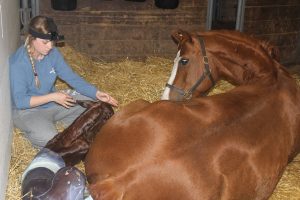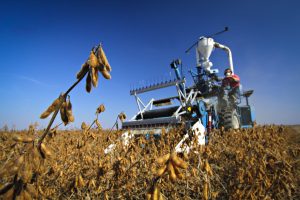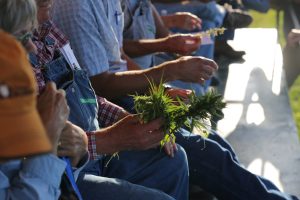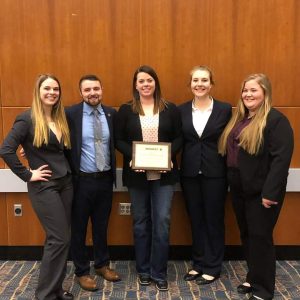Stories

April 13, 2020
Mizzou Made Meteorologists
The University of Missouri College of Agriculture, Food and Natural Resources’ atmospheric science program has trained and prepared meteorologists who are now spread throughout the United States, providing timely weather and climate information for the communities they serve. Two of those meteorologists serve one of the country’s largest cities – Nashville, Tennessee. Katy Morgan and Henry Rothenberg were classmates during their time at Mizzou and now serve as meteorologists for FOX 17 and News Channel 5, respectively. Both graduated from MU in 2006. “As students, Katy and Henry were both very passionate about meteorology,” said Pat Market, interim director of…

April 10, 2020
Q&A With Christa Smith
What are your job duties/job responsibilities in the College of Agriculture, Food and Natural Resources? I am the executive assistant to the division director in the Division Plant Sciences. I support Bruce Barrett with his calendar, travel, meeting minutes and work with faculty and MyVita, which is a faculty activity reporting system. I’m the liaison for all academics in plant sciences, so I work with the registrar’s office managing the course offerings and MyZou, and the graduate school for all issues related to the graduate students. I also handle phone inquiries that come into the division and coordinate web page…

April 9, 2020
Being Adaptable
Part of CAFNR’s mission is preparing students for a complex, interconnected planet. To thrive in tomorrow’s society, students must be adaptable learners and informed citizens to make purposeful contributions in the world. CAFNR provides these opportunities through exceptional experiential and practical learning experiences based on cutting-edge science and through communicating and engaging with people and the community. Students in CAFNR not only get a degree while in Columbia – they get the entire CAFNR experience. Students gain that experience through award-winning advisors and teachers, research opportunities with internationally renowned scientists, study abroad options tailored to degree programs and in more…

April 9, 2020
Moving the Agricultural Food Chain Forward
The Agricultural Experiment Station (AES) at the University of Missouri operates a system of Agricultural Research Centers across the state in an effort to meet the regional needs of agricultural producers and natural resource managers. With nearly 14,000 acres, these research and demonstration facilities host more than 35,000 people each year for field days, Extension activities and other community events. The various facilities play a vital role in the agricultural food chain in numerous ways, including seed variety trials, plant and animal breeding studies, and providing agronomic information. As research ramps down at MU due to the global COVID-19 pandemic,…

April 9, 2020
A Unique Opportunity
Last year, Missouri lawmakers passed a law that allowed producers to grow a crop that hasn’t been legal in the state in decades – hemp. The new law required that growers be licensed with the Missouri Department of Agriculture, and it also allowed universities to plant hemp right away to collect data for future plantings. Seven University of Missouri College of Agriculture, Food and Natural Resources Agricultural Research Centers planted a total of seven acres of hemp throughout the state. Those plantings happened from the end of June to early July. All were between half an acre and three acres.

April 2, 2020
Bringing Home a Win
Four University of Missouri College of Agriculture, Food and Natural Resources students captured first place at the regional Animal Science Academic Quadrathlon, which was held in conjunction with the American Society of Animal Science’s (ASAS) Midwest Conference last month. Jacob Blank, Madison Filley, Emily Shanks and Anna Tarpey will represent MU at the national competition, which is set to be held in July in Madison, Wisconsin. Four teams will compete at the national competition. The idea of the academic quadrathlon (AQ) was conceived in 1967, and the first official AQ competition was held in 1981 as part of the ASAS…

April 2, 2020
Incorporating Problem-Solving into Landscape Design
Tucked away in the CAFNR Courtyard between the Ag Building and Anheuser-Busch Natural Resources Building is a garden that’s celebrating its 40th anniversary this April. Students in the advanced landscape design course were challenged to revitalize the MU Woodland and Floral Garden in honor of the celebration. Zachary Ignotz is a senior studying plant sciences from Troy, Missouri. As a student in the advanced landscape design course last year, Ignotz created a design that would land him a spot at this year’s University of Missouri Visual Art and Design Showcase. Ignotz received the Award of Merit for his design,…

March 29, 2020
Vice Chancellor and Dean Daubert Named to CAST Board of Trustees
Vice Chancellor and Dean Christopher Daubert was named to the board of trustees for the Council for Agricultural Science and Technology (CAST). His term will run through 2021. CAST was established in 1972 as a result of a 1970 meeting sponsored by the National Academy of Sciences, National Research Council, and provides balanced, credible, science-based information about food and agriculture to policymakers, the media, the private sector, and the public.

March 29, 2020
Bryon Wiegand Graduates from Lead21
Dr. Bryon Wiegand, associate director and professor of animal sciences, graduated Feb. 20 from Class 15 of the LEAD21 leadership-development program. The primary purpose of LEAD21 is to develop leaders in land-grant institutions and their strategic partners who link research, academics and extension who canto lead more effectively in an increasingly complex environment, either in their current positions or future leadership positions.

March 29, 2020
Vice Chancellor and Dean Daubert elected to IFT Board of Directors
On March 2, Vice Chancellor and Dean Christopher Daubert was elected to the Institute of Food Technologists (IFT) Board of Directors. The chosen candidates were elected by the organization’s general membership and will officially take office Sept. 1, 2020. Since 1939, the IFT has been a forum for passionate science of food professionals and technologists to collaborate, learn, and contribute all with the goal of inspiring and transforming collective scientific knowledge into innovative solutions for the benefit of all people around the world.